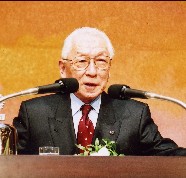��World Understanding Month�� Meeting
Rotary��s 101st Anniversary Meeting & Family Party
"What I have learned from sport"
February 22nd, 2006
Mr. Ken Naganuma,
Supreme advisor of the Japan Football Association
 No athlete thinks he does not owe his success today to everyone around him. A person who finds some success in sport thinks that it is his/her turn this time to return a favor. It is a so-called sense of gratitude. The athlete must not forget feelings of gratitude to everyone around him/her.
No athlete thinks he does not owe his success today to everyone around him. A person who finds some success in sport thinks that it is his/her turn this time to return a favor. It is a so-called sense of gratitude. The athlete must not forget feelings of gratitude to everyone around him/her.
Japanese soccer has grown up basically relying on Germany. I owe what I am now to Mr. Dettmar Cramer, an exceptional German leader. When I met Mr. Cramer first, I thought that he would be a philosopher. I was surprised at his comment, "Soccer makes a boy an adult, and helps an adult to transform him/herself into a gentleperson of the first class. Therefore I love soccer.��
His instruction is quite reasonable, ��To make players understand intellectually, to do and show it by himself, and to make players do it��. If they become to do well, he praises them. He will get angry if players are lazy even if only slightly. He insists that training and practice must be concentrated. The players cannot forget the word ��concentration�� which he repeated hundreds of times. ��Free time after thoroughly concentrated practice is the time for real relaxation. It is most important to have the time of not remembering even the character ��S�� of soccer,�� is his philosophy.
In the Olympic Games in Mexico of 1968, Japan did its best. The players were in dehydration, falling in the beds and shivering after the game finished. Mr. Cramer came to them when they settled down after having received medical attention. Mr. Cramer, who understood the situation, said to the reporters that happened to be there: ��You looked alarmed when I said that I wanted to meet YAMATODAMASHII (Japanese Spirits) in the early times of my coming to Japan. The YAMATODAMASHII just lies ahead. These players are just so.�� When I heard it, I came back into my room abruptly because I almost began to weep loudly due to emotion. I still remember that time.
The Japan Soccer League started in only 1965. Although some companions suggested to dare to hold the World Cup in Japan, it was premature to promote it, simply because there was no stadium at that time.
The Brazilian chairman of the Federation Internationale de Football Association (FIFA) said that he expressed a sense to hold it in 2002 in the Asian district. Once I heard so, it flashed through my mind that we could do it even in Japan. However, I understood that there was no record since the first game in Uruguay in 1930 that the World Cup was held in the country not having a professional soccer league.
Consequently, we started consultation with Mr. Saburo Kawabuchi, and carried out the search for a local government, which would build a stadium for us in order to make up a professional soccer league. Pursuant to FIFA��s conditions, all seats must be separated, and bench seats are not allowed. FIFA also stipulates that the roof must cover 60% or more of the seats, and a stadium for a preliminary game and the final game must accommodate 40,000 and 60,000 or more people respectively. We worried about building such a stadium to meet the said regulations, but actually we could have the one in Yokohama accommodating 70,000 people, and in Saitama 60,000 people, and also had stadiums in rural districts with 40,000 or more people. Actually, in the World League in 2002, 2,000 seats were necessary for the media per game. We could prepare them.
While we should also express our gratitude to co-sponsored South Korea, everything went well. I was convinced that soccer has escaped from being a minor sport.
The World Cup is held in Germany this year. Japan battles the first game with Australia on June 12. I expect Coach Zico will prepare players' good condition mentally and physically towards the game. I want to see a good result from winning the first game.